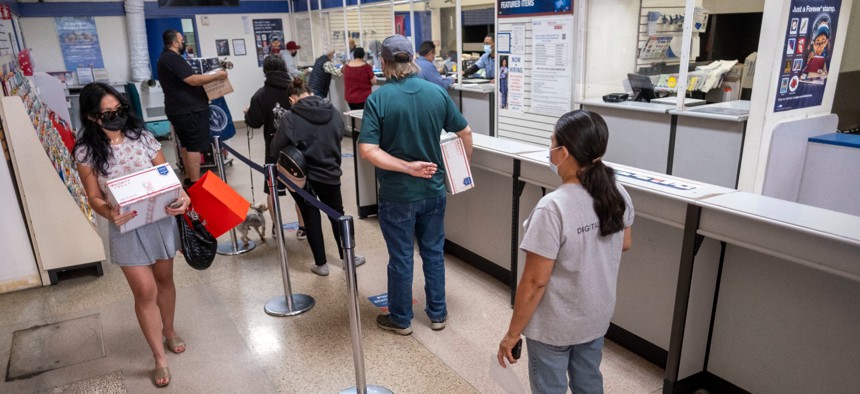Postal Service should 'act swiftly' to scale up identity services, IG says

People wait in line at the Van Nuys, Calif. Post Office, Nov 30, 2021. Hans Gutknecht/MediaNews Group/Los Angeles Daily News via Getty Images
USPS is working with the General Services Administration on more in-person options for Login.gov, according to a new whitepaper from the U.S. Postal Service's Inspector General.
There's a "window of opportunity" for the U.S. Postal Service to tap into its network of post offices, databases and identity verification experience to "contribute to filling service gaps in identity verification processes," according to new whitepaper from the USPS Office of Inspector General.
The May 11 paper details how USPS could use its infrastructure and data to work with other agencies as they grapple with how to verify the identities of Americans online and in-person in order to provide government services.
Since the onset of the COVID-19 pandemic and accompanying trillions of dollars in relief funds from the US government, agencies have struggled to address rising identity fraud and improper payments in government services and turned to private sector companies and internal systems to verify that Americans seeking government services are who they claim to be.
The Postal Service already has 17,000 locations where Americans can prove their identity in-person to be able to access certain USPS services like getting a P.O. box.
USPS should "act swiftly" to tap into this infrastructure to offer in-person proofing services, or act as a validator of identity attributes, for other federal and state government agencies, the inspector general report states.
Doing so could also mean collaborating more closely with the General Services Administration's Login.gov, a shared sign-on service.
The watchdog's whitepaper covers three options for the agency: offering in-person proofing capabilities for other government agencies; using its databases on Americans' addresses as part of the proofing process for other agencies and creating its own digital identity service, allowing people already verified with the USPS to use that credential to sign on to other agencies. The report notes that the last likely isn't a short term priority for the agency.
But offering its in-person identity verification tools to other agencies is something that the Postal Service is already doing with GSA and the FBI, according to the report, and has future potential to scale to other agencies.
After the pandemic caused GSA's credentialing offices to close, USPS worked with GSA to offer in-person identity proofing for GSA's Personal Identity Verification shared services program in DC-area post offices. GSA and USPS ended up announcing an expansion of the service from six to 22 locations in 2022.
Currently, USPS is planning on being certified at identity assurance level two by the National Institute of Standards and Technology, for its in-person proofing process by the end of the year, according to the report.
The Postal Service also has more in-person identity proofing work "in preparation" with GSA's Login.gov, according to the report. GSA did not respond to request for comment from FCW by publication time.
The idea that the postal service could be an asset for Login.gov is one also championed in the past by Waldo Jaquith, currently senior advisor at GSA, who flagged the potential of a GSA-USPS collaboration for in-person identity verification services in a 2021 report written while he was a fellow at Georgetown's Beeck Center.
Offering more in-person verification options as an alternative to a fully online service for Login.gov is already a goal for GSA.
Expanded in-person proofing at post offices could be a fallback for Americans who don't make it through digital identity proofing options and "a strong verification method for agencies requiring the collection of biometric ID credentials or seeking ways to fill gaps in or fortify their identity verification processes," the watchdog report states.
The report points directly to Login.gov as an example use case, saying that users "could verify their identity in-person at a local post office. The user would receive a QR code, go to their local post office, and present ID documents to the postal clerk for verification."
More USPS in-person proofing options could also be an option for citizens that might not have the broadband access or credit history needed to complete digital proofing options, as well as for victims of identity fraud who need to re-establish their identity to get access to government accounts again, the report states.
The Postal Service could also tap into its databases of addresses on behalf of other agencies, to give partners a level of assurance that someone does or doesn't live where they claim to, a data point that can be another part of the identity puzzle.
A response from USPS management included in the report states that USPS management "continues to evaluate the opportunities for expanded identity proofing and identity verification" and that "pilots in development and in progress lay the groundwork for a viable, sustainable and profitable long-term vision for these services."
It also notes, as the inspector general does as well, that this is "dependent on alternative funding sources to support any expanded services to the public."
USPS does not receive appropriations, so it would have to rely on other funding like reimbursements from work with other government agencies and service fees.
NEXT STORY: FBI Announces New Intelligence Directorate Chief



